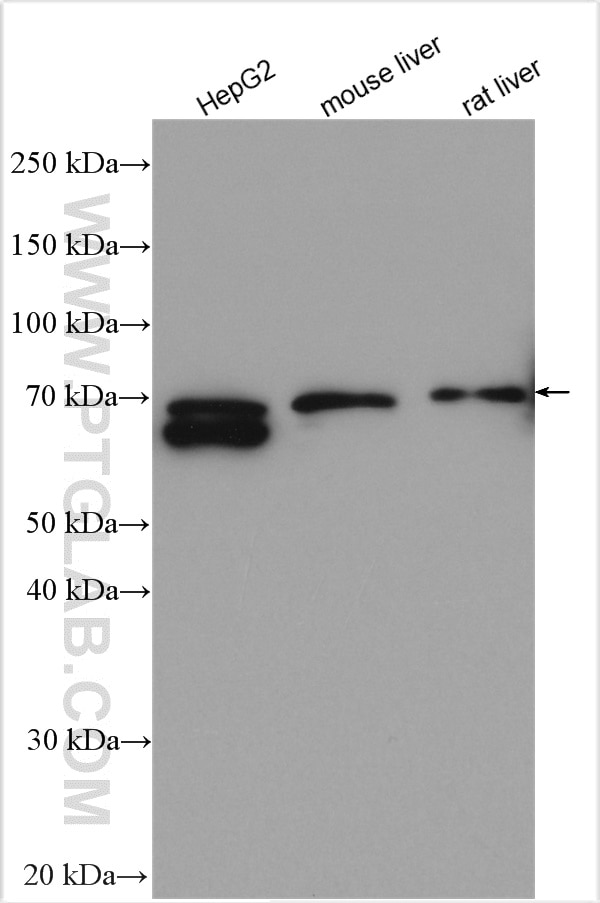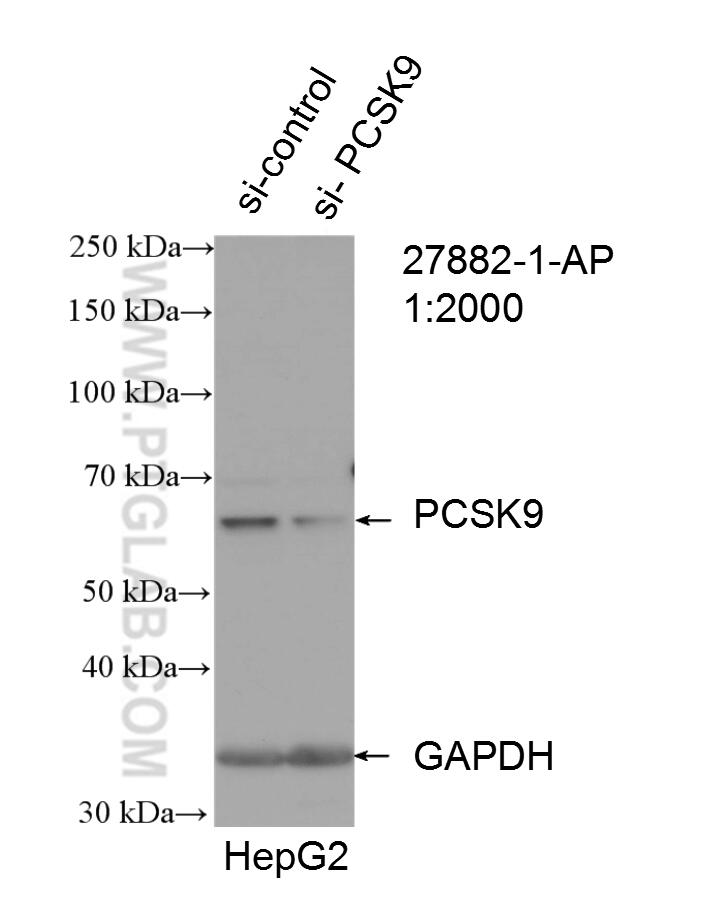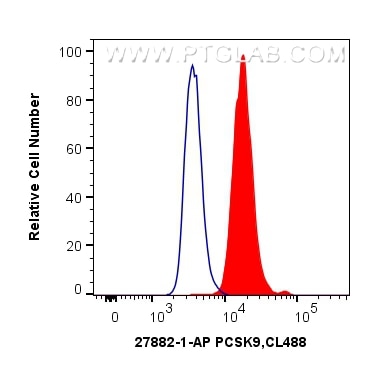- Featured Product
- KD/KO Validated
PCSK9 Polyklonaler Antikörper
PCSK9 Polyklonal Antikörper für WB, FC (Intra), ELISA
Wirt / Isotyp
Kaninchen / IgG
Getestete Reaktivität
human, Maus, Ratte
Anwendung
WB, IHC, IF, FC (Intra), ELISA
Konjugation
Unkonjugiert
Kat-Nr. : 27882-1-AP
Synonyme
Geprüfte Anwendungen
| Erfolgreiche Detektion in WB | HepG2-Zellen, Mauslebergewebe, Rattenlebergewebe |
| Erfolgreiche Detektion in FC (Intra) | HepG2-Zellen |
Empfohlene Verdünnung
| Anwendung | Verdünnung |
|---|---|
| Western Blot (WB) | WB : 1:500-1:2000 |
| Durchflusszytometrie (FC) (INTRA) | FC (INTRA) : 0.40 ug per 10^6 cells in a 100 µl suspension |
| It is recommended that this reagent should be titrated in each testing system to obtain optimal results. | |
| Sample-dependent, check data in validation data gallery | |
Veröffentlichte Anwendungen
| KD/KO | See 1 publications below |
| WB | See 9 publications below |
| IHC | See 4 publications below |
| IF | See 3 publications below |
Produktinformation
27882-1-AP bindet in WB, IHC, IF, FC (Intra), ELISA PCSK9 und zeigt Reaktivität mit human, Maus, Ratten
| Getestete Reaktivität | human, Maus, Ratte |
| In Publikationen genannte Reaktivität | human, Maus, Ratte |
| Wirt / Isotyp | Kaninchen / IgG |
| Klonalität | Polyklonal |
| Typ | Antikörper |
| Immunogen | PCSK9 fusion protein Ag27254 |
| Vollständiger Name | proprotein convertase subtilisin/kexin type 9 |
| Berechnetes Molekulargewicht | 74 kDa |
| Beobachtetes Molekulargewicht | 72-78 kDa, 62 kDa |
| GenBank-Zugangsnummer | NM_174936.3 |
| Gene symbol | PCSK9 |
| Gene ID (NCBI) | 255738 |
| Konjugation | Unkonjugiert |
| Form | Liquid |
| Reinigungsmethode | Antigen-Affinitätsreinigung |
| Lagerungspuffer | PBS with 0.02% sodium azide and 50% glycerol |
| Lagerungsbedingungen | Bei -20°C lagern. Nach dem Versand ein Jahr lang stabil Aliquotieren ist bei -20oC Lagerung nicht notwendig. 20ul Größen enthalten 0,1% BSA. |
Hintergrundinformationen
Proprotein convertase subtilisin/kexin type 9 (PCSK9) is a crucial protein governing the circulating levels of low density lipoprotein-cholesterol (LDL-C), by virtue of its pivotal role in the degradation of the LDL receptor (LDLR). PCSK9 is expressed in the kidney and lung. It is synthesized as a 72 kDa immature precursor that undergoes autocatalytic cleavage in the endoplasmic reticulum to generate a 63 kDa mature protein. The cleaved N-terminal fragment remains associated with the mature protein and is necessary for its secretion, allowing it to circulate in the blood. The ability of PCSK9 to regulate a diverse group of cell-surface proteins hinted that it might also be able to influence additional membrane proteins that are important in anti-tumour immune responses. Targeting PCSK9 to treat cancer is also attractive because two neutralizing antibodies against it, evolocumab and alirocumab, have already been approved for human clinical use to lower cholesterol levels. (PMID: 30522786, PMID: 22493497)
Protokolle
| PRODUKTSPEZIFISCHE PROTOKOLLE | |
|---|---|
| WB protocol for PCSK9 antibody 27882-1-AP | Protokoll herunterladen |
| FC protocol for PCSK9 antibody 27882-1-AP | Download protocol |
| STANDARD-PROTOKOLLE | |
|---|---|
| Klicken Sie hier, um unsere Standardprotokolle anzuzeigen |
Publikationen
| Species | Application | Title |
|---|---|---|
Phytomedicine LW-213, a derivative of wogonin, triggers reticulophagy-mediated cell death in NSCLC via lysosomal damage combined with NPC1 inhibition | ||
Biochimie High-salt diet induces dyslipidemia through the SREBP2/PCSK9 pathway in dahl salt-sensitive rats | ||
bioRxiv Effect of Total Sphingomyelin Synthase Activity on Low Density Lipoprotein Catabolism in Mice | ||
iScience Targeting PCSK9 reduces cancer cell stemness and enhances antitumor immunity in head and neck cancer
| ||
FASEB J Exogenous hydrogen sulfide alleviates hepatic endoplasmic reticulum stress via SIRT1/FoxO1/PCSK9 pathway in NAFLD | ||
JACC Basic Transl Sci PCSK9 Promotes Hypoxia-Induced EC Pyroptosis by Regulating Smac Mitochondrion-Cytoplasm Translocation in Critical Limb Ischemia |




